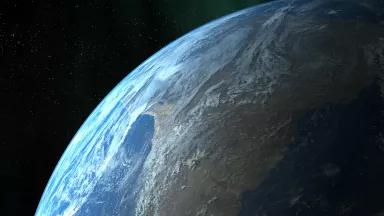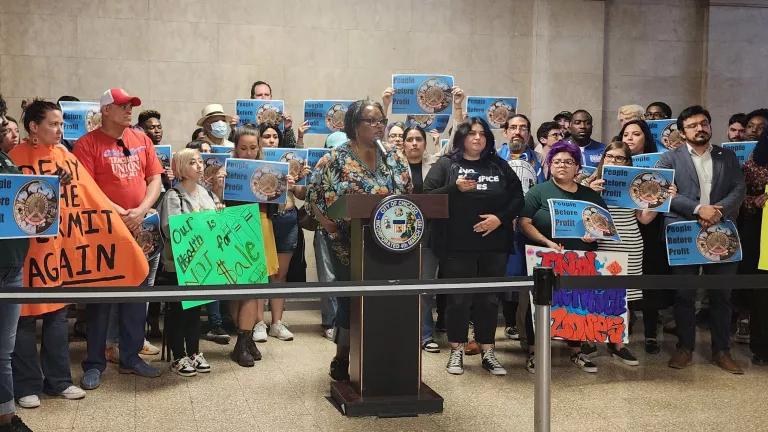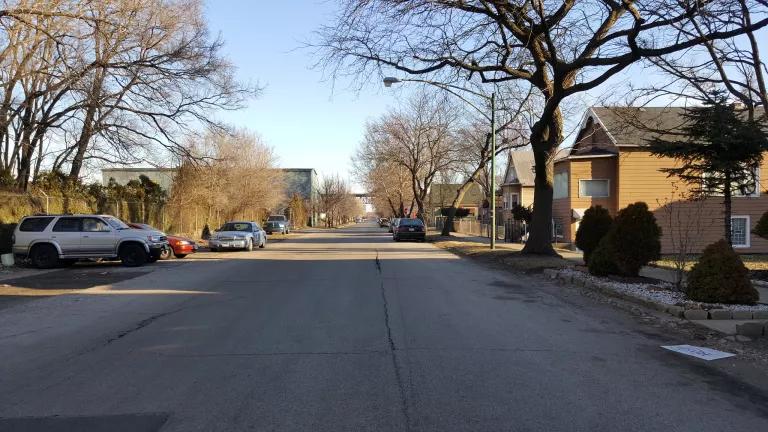Earth Day Should Be Every Day!
Four Chicago students share why clean water and air are human rights.

From left: Reyna, Kyla, Teddy, Khloe
Chakena D. Perry for NRDC
Kids growing up in Chicago are affected by the toxic chemicals in their drinking water and the air that they breathe. These impacts accumulate in communities of color and have created a public health crisis in Chicago. For Earth Month, I spoke with four students from four different schools who had powerful words to share about the quality of our air and water. Conversations like these keep me motivated to continue working toward solutions to the big problems that our city faces.
Meet Teddy, Kyla, Khloe, and Reyna.
Air pollution in Chicago
Teddy, a fifth grader at a South Side Catholic school, and Kyla, a sophomore at Lincoln Park High School, are aware of air pollution in Chicago.
Teddy is working on an Earth Month project for school about the dangers of particulate matter, including how easily it can travel through our lungs and bloodstream, and how we must identify and filter it more easily. Kyla is concerned about how gas leaks, cigarette smoke, and fires are affecting air quality in our communities.
In 2022, the American Lung Association (ALA) released its annual State of the Air report, and Chicago ranked number 16 out of the 25 cities that are most polluted by ozone; it is ranked number 22 of the 25 cities with the highest year-round particulate matter pollution. According to the ALA, ozone and particle pollution are “two of the most dangerous and pervasive air pollutants nationwide,” and particulate matter comes in different forms:
- Coarse particles: ash, dust, pollen, and smoke
- Fine particles: by-products of burning wood or fossil fuels
- Ultrafine particles: combustion
A recent WBEZ analysis listed Austin, Englewood, Little Village, and other Chicago neighborhoods as “pollution hot spots” for their proximity to high-traffic, industrial corridors. When asked, “What does a clean and healthy Chicago mean to you?” Teddy and Kyla agreed that access to fresh, clean air is a human right, and all Chicago residents should have access to it.
Water quality in Chicago
Khloe, a freshman at George Westinghouse High School, and Reyna, a junior at Alcott College Prep High School, weighed in about the quality of drinking water in Chicago.
Khloe doesn’t trust her tap water and primarily drinks bottled water. Last year, she worked on a school project about lead in drinking water, and her teacher provided kits for students to test their water at home. The class also read stories about the effects of lead poisoning on people’s health and learned about ways to prevent it.
Reyna personally doesn’t drink bottled water because they try to limit their use of single-use plastics, and their family uses a water filter for their daily water consumption. As both students reflected on water accessibility in Chicago, they noted that there are certain areas where we have forgotten about people and have not given people the chance to get clean water.
From the slow pace of lead service line replacement to the presence of the PFAS "forever chemicals” in our drinking water, both Khloe and Reyna are aware of Chicago’s water woes—with Khloe suggesting that we “test the water regularly, every few months” and Reyna being “excited” and “hopeful” that “we’re starting a new page” to address this public health issue.
Wait, there’s more!
Kyla referenced a lesson in her biology class about the cholera epidemic in Europe and how residents did not know their water was contaminated, causing thousands of deaths.
“I do trust the filtration from Lake Michigan, but at the same time, I don’t, because of the potential of something serious like cholera happening again, but I do think that lead is a primary issue in our water,” says Kyla.
Teddy is more concerned about water consumption and how we can reduce our water footprint. “Water is an important part of human life, and using a lot of water is hurtful,” Teddy says. “The main takeaway from our water footprint lesson is that we should stop buying things that take a lot of water to produce. If you want a snack and have to choose between a chocolate bar and an apple, choose the apple because it takes a lot less water to produce.”
Earth Month call to action
Unfortunately, Chicago’s air and water quality aren’t the greatest, but I believe in the power of our youth to keep raising awareness of these issues and using their talents to make a difference. When asked, “What’s something related to the environment in or around your school that you wish would improve?” here are the messages these dynamic young people want you to remember this Earth Month:
“I encourage others not to litter. It’s a simple task not to do, but there’s so much garbage in the grass. We can form community groups to clean it up, and it will provide a little encouragement. Sounds simple, but by cleaning up, it connects us as a community because we can do things together and take care of the environment.”
Reyna, junior
“Across the street from my school, there’s a broken and abandoned building. I think they should look better and nicer. It makes the community look tacky.”
Khloe, freshman
“I would give [politicians] a lecture on climate change and tell them about all the things they as a politician should focus on, but even more, why they should care about these issues as a person, as a human being.”
Teddy, fifth grader
After speaking with these students, I am confident that our earth is in good hands. My final message? Well, I think Teddy said it best:
“Earth Day should be every day. We can't just have one day or one month where we protect our planet. We have to try and take care of the earth all the time.”
Teddy
You heard him. Happy Earth Month!




